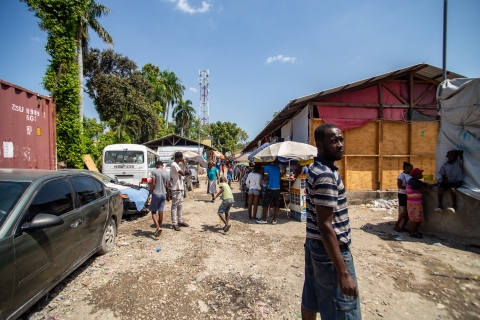
Gangs continue to exert power in Haiti as a transitional government takes office, and the United States blocks the path of migrants fleeing the violence while failing to stop the flow of illegal weapons to the Caribbean nation.
The following article was published in the May-June 2024 issue of NewsNotes.
Haitian Prime Minister Ariel Henry officially resigned on April 25, more than a month after promising to do so, and a transitional governing council was sworn in the same day. Henry’s term officially ended February 7, leaving the country without a constitutional government—the last senators’ terms ended in January, 2023. Henry left the country later in February and has been residing in exile in the United States. As powerful gangs continue to control large swaths of territory in Haiti, especially in urban centers, the transitional council must contend with a deteriorating security outlook and gang leaders who themselves seek a role in Haiti’s governance.
While the council was created by the United States and Caribbean CARICOM leaders, the international community continues to discern what to do about the chaos and violence in Haiti. A Kenyan-led international security force, first proposed and funded by the United States, has yet to materialize, as the plan faces political and legal challenges within Kenya. Maryknoll has met with numerous foreign policy observers and policymakers in Washington who continue to suggest sending U.S. troops to quell gang violence, but the Biden Administration has shown no interest in pursuing such a response.
On March 11, Maryknoll Lay Missioners were forced to suspend their presence in Haiti due to security concerns. Lay Missioner Sami Scott, who evacuated the country after armed gangs attacked the rural town of Gros Morne where she lives, visited Washington, DC in March to speak with policymakers and faith leaders about the situation on the ground. In a presentation hosted by MOGC and the Stuart Center, she emphasized the need for Haitians to determine their own path forward.
Scott described a complete lack of trust in political leaders among her neighbors in Gros Morne, and a shared sense that the government does nothing for them. She says Haitians must be allowed to determine what kind of government they want for themselves if they are to trust any government the council may establish.
Scott operated a henhouse project in Gros Morne, to improve food security and income generation in the community. Almost half of Haiti’s people are struggling to feed themselves as gang violence spreads across the country, forcing people to stay home. Inflation and poor harvests have also helped push Haiti to its worst levels of food insecurity on record.
Despite a violent attack on Gros Morne in February, Scott describes the gangs’ presence in the area as much less visible than in Port-Au-Prince, four hours south. But supplies are short and economic activity in the area has been hobbled by the violence in ports and on main roads. Given the chance and a place to go, she said, most inhabitants would leave Haiti to escape both physical and economic insecurity. However, while the United States has already pledged $200 million to send an armed international security force into Haiti and has failed to stop the flow of weapons into the country from its own shores, the government continues to detain and deport fleeing Haitians who attempt to enter the United States.
On April 8, MOGC joined 100 other faith organizations in delivering a letter to President Biden, Secretary of State Blinken, and Homeland Security Secretary Mayorkas urging them to extend Temporary Protective Status (TPS) for Haiti, halt plans to bring detained Haitians to Guantanamo Bay or other detention centers outside the United States, halt deportations to Haiti and release Haitian detainees, expand parole and maintain access to asylum for Haitian migrants. Citing the displacement of over 160,000 Haitians since February, and expressing special concern over “reports of rape, indiscriminate kidnapping, and vigilante violence against the civilian population,” the letter explains, “Mass migration from Haiti is closely tied to historical Western foreign interventions. The ramifications of this history and ongoing crisis continue to put the lives, rights, and freedoms of all Haitians at risk.”
Scott also emphasized the need for the United States to better control illegal shipments of arms and ammunition from its own shores to Haiti. Gang affiliates buy the weapons in states with weak gun control laws and smuggle them on ships leaving the Port of Miami River Terminal for the Caribbean.
“In the five years I have served in Haiti, the number of guns in the hands of criminals has increased dramatically,” Scott explains. “The United States must stop being complicit in the insecurity of Haiti (by stopping) the illegal trafficking of arms from the U.S. to Haiti. To let it continue is a crime against humanity.”
Faith in Action
Join Sami Scott in telling Congress to strengthen oversight of small arms shipments and stop the flow of illegal weapons: https://mogc.info/HaitiArmsFlow
Photo of displaced people in the Port-au-Prince metropolitan area by Fonds CERF - United Nations OCHA, March 21, 2024 via Flickr.
